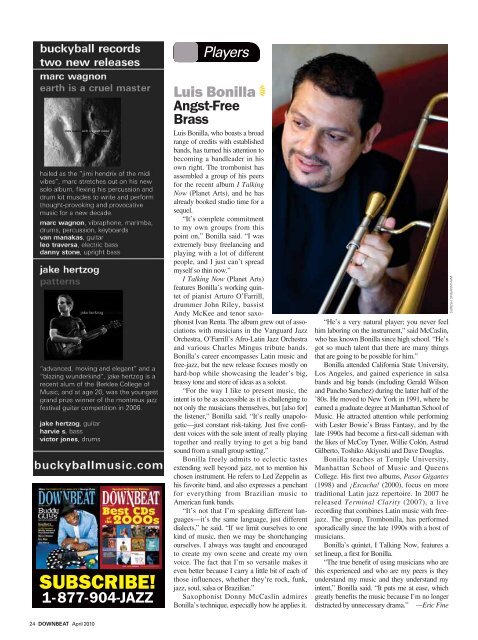Download - Downbeat
Download - Downbeat
Download - Downbeat
- TAGS
- download
- downbeat
- downbeat.com
You also want an ePaper? Increase the reach of your titles
YUMPU automatically turns print PDFs into web optimized ePapers that Google loves.
SUBSCRIBE!<br />
1-877-904-JAZZ<br />
24 DOWNBEAT April 2010<br />
Players<br />
Luis Bonilla ;<br />
Angst-Free<br />
Brass<br />
Luis Bonilla, who boasts a broad<br />
range of credits with established<br />
bands, has turned his attention to<br />
becoming a bandleader in his<br />
own right. The trombonist has<br />
assembled a group of his peers<br />
for the recent album I Talking<br />
Now (Planet Arts), and he has<br />
already booked studio time for a<br />
sequel.<br />
“It’s complete commitment<br />
to my own groups from this<br />
point on,” Bonilla said. “I was<br />
extremely busy freelancing and<br />
playing with a lot of different<br />
people, and I just can’t spread<br />
myself so thin now.”<br />
I Talking Now (Planet Arts)<br />
features Bonilla’s working quintet<br />
of pianist Arturo O’Farrill,<br />
drummer John Riley, bassist<br />
Andy McKee and tenor saxophonist<br />
Ivan Renta. The album grew out of associations<br />
with musicians in the Vanguard Jazz<br />
Orchestra, O’Farrill’s Afro-Latin Jazz Orchestra<br />
and various Charles Mingus tribute bands.<br />
Bonilla’s career encompasses Latin music and<br />
free-jazz, but the new release focuses mostly on<br />
hard-bop while showcasing the leader’s big,<br />
brassy tone and store of ideas as a soloist.<br />
“For the way I like to present music, the<br />
intent is to be as accessible as it is challenging to<br />
not only the musicians themselves, but [also for]<br />
the listener,” Bonilla said. “It’s really unapologetic—just<br />
constant risk-taking. Just five confident<br />
voices with the sole intent of really playing<br />
together and really trying to get a big band<br />
sound from a small group setting.”<br />
Bonilla freely admits to eclectic tastes<br />
extending well beyond jazz, not to mention his<br />
chosen instrument. He refers to Led Zeppelin as<br />
his favorite band, and also expresses a penchant<br />
for everything from Brazilian music to<br />
American funk bands.<br />
“It’s not that I’m speaking different languages—it’s<br />
the same language, just different<br />
dialects,” he said. “If we limit ourselves to one<br />
kind of music, then we may be shortchanging<br />
ourselves. I always was taught and encouraged<br />
to create my own scene and create my own<br />
voice. The fact that I’m so versatile makes it<br />
even better because I carry a little bit of each of<br />
those influences, whether they’re rock, funk,<br />
jazz, soul, salsa or Brazilian.”<br />
Saxophonist Donny McCaslin admires<br />
Bonilla’s technique, especially how he applies it.<br />
“He’s a very natural player; you never feel<br />
him laboring on the instrument,” said McCaslin,<br />
who has known Bonilla since high school. “He’s<br />
got so much talent that there are many things<br />
that are going to be possible for him.”<br />
Bonilla attended California State University,<br />
Los Angeles, and gained experience in salsa<br />
bands and big bands (including Gerald Wilson<br />
and Pancho Sanchez) during the latter half of the<br />
’80s. He moved to New York in 1991, where he<br />
earned a graduate degree at Manhattan School of<br />
Music. He attracted attention while performing<br />
with Lester Bowie’s Brass Fantasy, and by the<br />
late 1990s had become a first-call sideman with<br />
the likes of McCoy Tyner, Willie Colón, Astrud<br />
Gilberto, Toshiko Akiyoshi and Dave Douglas.<br />
Bonilla teaches at Temple University,<br />
Manhattan School of Music and Queens<br />
College. His first two albums, Pasos Gigantes<br />
(1998) and ¡Escucha! (2000), focus on more<br />
traditional Latin jazz repertoire. In 2007 he<br />
released Terminal Clarity (2007), a live<br />
recording that combines Latin music with freejazz.<br />
The group, Trombonilla, has performed<br />
sporadically since the late 1990s with a host of<br />
musicians.<br />
Bonilla’s quintet, I Talking Now, features a<br />
set lineup, a first for Bonilla.<br />
“The true benefit of using musicians who are<br />
this experienced and who are my peers is they<br />
understand my music and they understand my<br />
intent,” Bonilla said. “It puts me at ease, which<br />
greatly benefits the music because I’m no longer<br />
distracted by unnecessary drama.” —Eric Fine<br />
SURESH SINGARATHAM

















